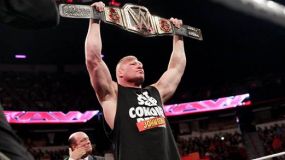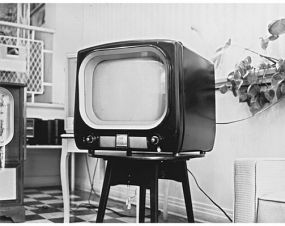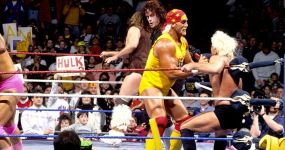Oh The Exciting Road That We Are On...
Written by Tad BukowskiFirst and foremost – Happy WrestleMania season everyone!
FastLane is now in our rearview mirror and WrestleMania is now just on the edge of the horizon. These next few weeks are set to be the most exciting of the year.
The excitement doesn’t seem to be contained to inside the ring. With so much going on, and potentially going on behind the scenes, I just wanted to take some time to throw my two cents in on some of the topics that have made their way to the public.
THE BUSHWHACKERS ENTER THE HALL OF FAME
For a few years in the late 80s-early 90s, Luke and Butch marched and whacked their way into the hearts of the WWF fan base. When their music it, almost everyone in the arena, and probably some watching at home, would join the two superstars from down under in waving their arms…which symbolized whacking bushes I guess. Those who are my age might also remember their performance on an episode of Family Matters as well (A CAWP??? WE HATE CAWPS!!!!!!). Simply put, The Bushwhackers were one of the more memorable teams of that era.
That being said, I could blink and come up with three teams more deserving of the Hall of Fame call off the top of my head – and if you give me a few minutes I’m sure that I could come up with a few others!
The Bushwhackers are no Fabulous Freebirds, no Demolition, and no New Age Outlaws – all teams that are clearly more deserving of a Hall of Fame bid. It’s decisions like this that have me starting the question the legitimacy of the Hall of Fame.
I understand that there are some wrestling legends that just have a problem with WWE and/or Vince McMahon in particular and just don’t want to be associated with the company. That’s fine. I personally don’t agree with them. Why not be recognized for your achievements?
That’s not the case, though, for at least two of the previously mentioned three teams. Both of the Outlaws, Road Dogg and Billy Gunn, along with the last living member of the Freebirds Michael Hayes work for company. Hard to think they have an issue with Vince now. I don’t know for sure what the mindset of Demolition is, but I can’t say I have heard a negative interview given by Ax and Smash.
At least Koko B. Ware now has some company in the “Most Undeserving Member of the Hall” conversation.
HOPE FOR CESARO?
At FastLane, Cesaro and Tyson Kidd long and eventful journey in the tag team division finally culminated with a win over The Usos and capturing the elusive tag team titles!
OK, that’s not the hope that I’m talking about for the Swiss Superman – but at least it’s something.
I was thinking of the situation that Cesaro has been in since WrestleMania 30 and was trying to think of a comparison of such an epic drop off after what seemed to be the start of a star in the making.
Then it hit me – and THIS is where the hope for Cesaro comes in. This situation is very similar to that of a situation we saw play out in 2008.
Figure it out yet?
This could be CM Punk 2.0.
At WrestleMania 24, Punk won a very entertaining Money in the Bank match. A few months later, he cashed in and pinned a nearly knocked-out Edge to become the World Heavyweight. To say that Punk’s first title run was uneventful was an understatement. He never headlined a pay per view as champion and ended up losing the belt by being knocked out before the match started.
After that, Punk went back to having nothing to do for a long time until he had a cup of coffee with the Intercontinental Championship and the tag belts with Kofi Kingston.
A year after winning his first Money in the Bank, Punk went into WrestleMania 25 was won the Money in the Bank match for the second year in a row. This time, Punk cashed in on top face Jeff Hardy and very quickly became one of the most hated men on the show. Punk never looked back and became one of biggest names in the business before his unceremonious departure in early 2014.
I’m not saying that Cesaro will be as big a name as CM Punk became, but the road traveled has been pretty similar to this point. Cesaro won the Andre the Giant battle royal last year – had a run as the new “Paul Heyman Guy” until he seemingly fell off the face of the wrestling Earth. The tag title win with Kidd is similar to Punk and Kofi.
Now with WrestleMania right around the corner, with WWE recently announcing that the Andre the Giant Memorial Battle Royal will indeed be an annual event much like the Money in the Bank match was, having Cesaro win the match for a second year in a row and a character turn for Cesaro much like Punk saw in 2009 could be the start of a new star.
That is as long as Cesaro realizes that there are only three ropes, not four.
THE BIGGEST FREE AGENT IN THE BUSINESS
TNA, or Impact Wrestling (whatever they are this week) has never really been seen as stiff competition for WWE. A majority of the success that they have seen over the course of the last decade has come from aging WWE and WCW stars such as Sting, Hulk Hogan and Kurt Angle.
However you have to give them credit where credit is due – TNA has been able to help build a few stars whose only claim to fame is from their time in the Asylum and the Impact Zone. Guys like AJ Styles, Christopher Daniels, Kazarian and Chris Saban rose to the top of a TNA card but never really seemed to be a fit for WWE – at least not during their prime run.
One guy that had always stood out to me as someone I would like to see in WWE has recently hit the market – Samoa Joe. Joe has been a staple down in Orlando for the better part of the last decade and has created a strong fan base.
The reports are out there that Triple H is interested and Vince is not. Now may be a perfect time for a “let’s see what he can do” situation. With the recent wave of Indy stars that have been added to the NXT roster as of late, Joe could fit right in with that group without Vince worrying about bringing him on to Raw right away.
The decision is ultimately his, but if the WWE has ever been in Joe’s 5-year plan (and why wouldn’t it be) it may be now or never.
THE FUTRE OF THE BEAST
Well this is just something that keeps getting more interesting by the minute.
When I first started writing this piece my intent was to just talk about Brock Lesnar, contrary to every report that had been out there for the past year, was thinking about staying with WWE and not go back to UFC once his contract was up around WrestleMania.
That news in itself was big. To me, that opens up the main event for WrestleMania. Ever since the articles started coming about Lesnar leaving, the assumption was that whoever he was facing for the title would win. The thought of Lesnar still being with the company post-WrestleMania adds, and really creates, the element of the unknown of the match outcome which just leads to a more exciting finish for the show of shows.
Since then, the reports have come out that Lesnar walked out on Raw before the show ended and before he was supposed to make an appearance on the show. Word is that there was a backstage meeting with Lesnar that left the WWE World Heavyweight Champion with a bad taste in his mouth and he just left.
Word is that it is a business situation and not a creative situation. Unfortunately the narrow-minded internet bookers that I have talked about before decided to start a rumor that Lesnar was upset that Vince had decided not to suspend Roman Reigns for a failed drug test.
Thankfully those whose opinions and insights matter in the business quickly dismissed and thought of Reigns failing a test – but the question remains, what was Lesnar upset about and will it have an effect on this year’s WrestleMania main event?
Ah you have to love the drama before the drama!
What do you think? Did The Bushwhackers deserve the Hall of Fame nod? Does Cesaro still have a chance? Will we see Samoa Joe in WWE or NXT? What the hell is going on with Brock? Let me know on Twitter @Tadigity24.
Douglas Adams: 42 Things (Give or Take) You Didn't Know Previously
Written by David Biggs"I love deadlines. I like the whooshing sound they make as they fly by."
Whooooooooosh. That’s how I felt when I finally got around to beginning the herculean task of digging deep into the history of Douglas Adams and his works. Obviously we can’t cover everything here, but since there are already so many biographies and profiles out there detailing the basics – why not just quickly cover the bases and dive right into the fun stuff? Why not, indeed.
 First of all, if you stumbled here by accident or ignorance and you’re not sure who Douglas Adams is, he is most well-known as the author of The Hitchhiker’s Guide to the Galaxy, a book series that grew into an empire of media and is supported by legions of die-hard fans. But we’ll get back to all of that.
First of all, if you stumbled here by accident or ignorance and you’re not sure who Douglas Adams is, he is most well-known as the author of The Hitchhiker’s Guide to the Galaxy, a book series that grew into an empire of media and is supported by legions of die-hard fans. But we’ll get back to all of that.
Tune into the drinkfive Retrospectical Podcast (Episode 02: Douglas Adams, The Life and Times of)
Born on the 11th of March, 1952 in Cambridge, England, the Adams family (just the one ‘D’, mind you) actually moved to and lived at a RSPCA (Royal Society for the Prevention of Cruelty to Animals) shelter in Brentwood, Essex shortly after his sister, Susan was born. He was about 5-years old at the time, when his parents divorced and he went with his mother and sister to live at the shelter with his grandparents. It makes sense that this time in his life may have sparked his love for animals and nature and he went on later in life to become a well-known environmentalist and wrote Last Chance to See, a novel and radio series on the BBC about witnessing species near extinction first-hand over several trips.
Back to School
Known for his humor and writing prowess at an early age, Adams went through his school years being noticed not only for excellence in creative writing (he was the only student ever awarded a 10/10 by his English teacher Frank Halford in prep school) but also because he was already a towering 6-feet tall when he was just 12-years old (he would top out at 6’5”). By all accounts he breezed through university on nearly wit alone and was able to explore quite a few avenues of his creativity – not only on the page, but also onstage as a comedian.
In addition to the adventures he surely had while staying at his grandparent's animal shelter, Douglas hitch-hiked from Cambridge to Istanbul (not Constantinople) and elsewhere around Europe in the years surrounding his education at St. John's college. Not being from a particularly affluent family, he needed some way of making money to support himself while traveling and among other short-lived professions he worked as a barn builder, a chicken-shed cleaner and a hospital porter (for those not familiar with the job, it involves running laundry, patient hygiene and other similar tasks).
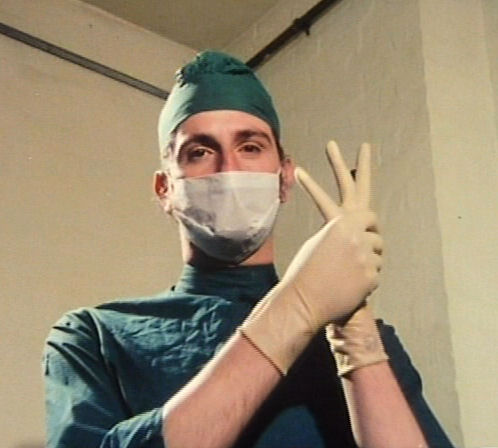 It becomes clear when looking over what has been recorded of Adams' life that he had no qualms whatsoever about taking whatever job could get him through the next few months or years between writing projects. My personal favorite was Adams' stint as a bodyguard to a Qatari family of oil tycoons while they were staying in London. According to Adams, that particular job involved "opening and shutting doors and running away if anyone turned up with a hand grenade". Yikes.
It becomes clear when looking over what has been recorded of Adams' life that he had no qualms whatsoever about taking whatever job could get him through the next few months or years between writing projects. My personal favorite was Adams' stint as a bodyguard to a Qatari family of oil tycoons while they were staying in London. According to Adams, that particular job involved "opening and shutting doors and running away if anyone turned up with a hand grenade". Yikes.
Anyway, it was a very uneven path that Adams walked after his days at St. John's and since falling in love with comedic performance (he had been involved with several during his days in Cambridge) he was bent on getting into TV and/or radio as a comedy writer. He was one of only two people outside of the original cast of Monty Python to get a writing credit (in this case for a sketch called "Patient Abuse") and later even appeared in 2 episodes (one of them being episode 42, no less!) of Monty Python's Flying Circus.
Frustration & Inspiration
Unfortunately - after enjoying some successes - Adams' opportunities slowed to a crawl. It was during this time that he tried to support himself through the mess of odd jobs mentioned above. He had a hard time dealing with this lack of interest in his work and that was reflected in his opinions of himself at the time. From Adams' The Salmon of Doubt, "I have terrible periods of lack of confidence [...] I briefly did therapy, but after a while I realized it was like a farmer complaining about the weather. You can't fix the weather - you just have to get on with it".
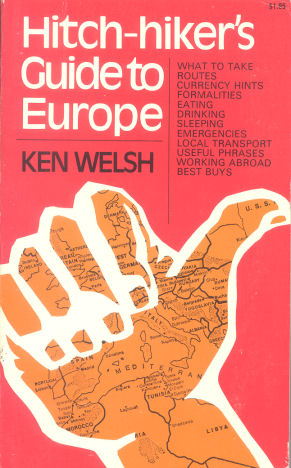 So, how did The Hitchhiker’s Guide to the Galaxy get its start when it looked as though Adams was already nearing the end of what would have been a rather short career? First, let’s go back to one of those nights he spent hitchhiking around Europe (Innsbruck, Austria in this case) before heading back to his studies in Cambridge. At the time, Adams had been using a copy of Hitch-hiker’s Guide to Europe to make his way around and one night when he was “frantically depressed” in Innsbruck he stared [drunkenly] up at the stars and thought that maybe there should be a Hitchhiker’s Guide to the Galaxy because it “looked a lot more attractive out there than it did around me.”
So, how did The Hitchhiker’s Guide to the Galaxy get its start when it looked as though Adams was already nearing the end of what would have been a rather short career? First, let’s go back to one of those nights he spent hitchhiking around Europe (Innsbruck, Austria in this case) before heading back to his studies in Cambridge. At the time, Adams had been using a copy of Hitch-hiker’s Guide to Europe to make his way around and one night when he was “frantically depressed” in Innsbruck he stared [drunkenly] up at the stars and thought that maybe there should be a Hitchhiker’s Guide to the Galaxy because it “looked a lot more attractive out there than it did around me.”
It wasn't immediately, but rather when he was backed into a corner and nothing else seemed to be working out for him did Adams come back to this idea of writing a Hitchhiker’s Guide to the Galaxy. Like so many other artists before him, it seemed as though all of his worldly experiences up to that point came together in one creative surge to produce the story-line and characters in their original form. Originally, Hitchhiker’s was developed as a sci-fi comedy radio play composed of six episodes (Douglas called them Fit the First, Fit the Second, etc as an homage to The Hunting of the Snark by Lewis Carroll) and quickly became a cult favorite in spite of the lack of advertising (in fact, the first episode aired at the awkward time of 10:30pm on a Wednesday night).
There were several things about the radio series that contributed to its popularity and uniqueness among all of the other material on BBC Radio at the time:
- Peter Jones was the voice of The Book in the series; the creators were actually looking for someone with a ‘Peter Jonesy sort of voice’. When they failed in their search, they hired Peter Jones himself.
- It was the first comedy series on BBC Radio to be made in Stereo. Sound effects were among the things deemed most important for the show.
- The theme song was a cover of a song from The Eagles’ album One of These Nights, called “Journey of the Sorcerer.” It was covered several times for different releases of the program, but the whole point was that the arrangement of the song sounded futuristic while still keeping a “hitchhiking feel” because of the predominance of the banjo throughout the piece.
Moving Right Along..
With the success of the radio show, Adams was given a job at the BBC as a radio producer but he was never really interested in the position, instead wandering over to work on Doctor Who as a script editor. He later went on to pen several Doctor Who episodes including “City of Death” which is widely regarded as one of the best classic Doctor Who stories of all time. Nice work, Douglas. A few notable things from these days:
- Life, the Universe and Everything (the 3rd novel in the Hitchhiker’s series) was apparently first born into the world as a Doctor Who story, with the working title “Doctor Who and the Krikkitmen”. When the screenplay was never produced, Adams re-wrote the story with characters from Hitchhiker’s to fit that universe instead. Slartibartfast as the Doctor, Starship Bistromath as the TARDIS and the Krikkiters for the Daleks.
- A permanent part of the Doctor Who universe, the Sixth Doctor mentions him in saying that “my old friend Douglas” used to say the response to “What’s wrong with getting drunk?” is “Ask the glass of water.” Also, in the novel version of a Doctor Who story that Adams wrote called “Shada,” a character claims to have replaced a copy of The Worshipful and Ancient Law of Gallifrey with The Hitch- (and is at that point interrupted).
- When at school, Adams wrote and performed a play that he called Doctor Which.
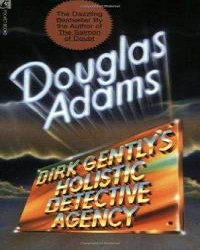 Douglas Adams eventually finished 5 novels in the Hitchhiker’s Guide series as well as two radio series (Fit the First through Fit the Twelfth) and there have been additional radio series’ and novels but they were all finished and produced after Adams passed away in 2001. So far the series has been a radio broadcast, multiple theater productions, a “trilogy” of books, a BBC TV series, a computer game, a comic book mini-series and a Hollywood movie. He also wrote two novels in a different universe with different characters, called Dirk Gently’s Holistic Detective Agency (described as “a kind of ghost-horror-detective-time-travel-romantic-comedy-epic”). These novels had some critical success but never reached the level of his most famous series.
Douglas Adams eventually finished 5 novels in the Hitchhiker’s Guide series as well as two radio series (Fit the First through Fit the Twelfth) and there have been additional radio series’ and novels but they were all finished and produced after Adams passed away in 2001. So far the series has been a radio broadcast, multiple theater productions, a “trilogy” of books, a BBC TV series, a computer game, a comic book mini-series and a Hollywood movie. He also wrote two novels in a different universe with different characters, called Dirk Gently’s Holistic Detective Agency (described as “a kind of ghost-horror-detective-time-travel-romantic-comedy-epic”). These novels had some critical success but never reached the level of his most famous series.
So Long and Thanks for All the Fish..
Other stuff you may not know about Douglas Adams:
- He was an atheist who was “convinced that there is not a god”. A friend of Richard Dawkins, he was outspoken on religion and religious topics.
- After achieving success with Hitchhiker’s, Adams was able to pursue his own projects free of financial constraints. He used this freedom to champion environmentalism, traveling across the world in order witness endangered species in their native habitats and write about them in Last Chance to See. He climbed Mt. Kilimanjaro in a rhino suit to support Save the Rhino International. Since Adams’ death, Save the Rhino has had a memorial lecture in Adams’ name to raise money featuring many notable personalities. 2015 found Neil Gaiman speaking on Immortality and Douglas Adams, for example.
- An early supporter of the Apple Macintosh, Adams was an “Apple Master”, a program that Apple ran which featured celebrities that were also users and evangelists for the Macintosh. It is said that he was the first person to buy a Macintosh in all of Europe, but some say that it was actually Stephen Fry.
- Douglas wrote a documentary film called Hyperland starring Tom Baker (of Doctor Who fame) in 1990 – it basically details how hypertext could create interconnected pathways of text, audio and video that we could explore in real-time through a network. In other words, the World Wide Web. Very much into technology and on the cusp of new ideas, Adams started a company called The Digital Village in 1994 who produced the game Starship Titanic and started H2G2.
- For his 42nd birthday, Pink Floyd guitarist David Gilmour invited Douglas to play guitar on stage with the group at a concert. Shortly afterward, Gilmour asked Adams to help the band name their latest album - he did just that which resulted in Division Bell.
Evolution of TV: How Television has Changed America
Written by Jason EvansTelevision is a marvelous beast all its own. It stands apart from film, which is mostly an artistic venture, and it is still the king of media, though the internet is furiously trying to overtake it. With television, you get a little bit from every world. TV entertains, informs, educates, wastes your time, excites you and ultimately could wind up as a phenomenon that only lasts for about a century.
Allow me to get sidetracked for just a moment. Here at drinkfive.com, our focus has mainly been on fantasy football, but there is so much more to discuss during the offseason. This year, we want to expand our view and talk about all kinds of different topics. We chose TV as a logical place to start because it's such an integral part of the entire football experience.
Tune into the drinkfive Retrospectical Podcast (Episode 01: Evolution of TV)
We've also decided to continue reviewing TV shows on a weekly basis (sometimes just one show, sometimes more than one). Look for a bonus 30 minute podcast following our regular weekly podcasts. Our first show will be on the much hyped prequel to "Breaking Bad", "Better Call Saul".
So, back to the history of TV. We want to look at the history of TV because it's pretty interesting and has resulted in some truly amazing people and programs. We wouldn't have Mel Brooks, the Twilight Zone, Saturday morning cartoons, live breaking newscasts, the Simpsons and a million other things that have shaped our current pop culture without TV.
Early TV's
Film can be looked at as the older brother of TV. While cinemas were starting to be filled and movies went from silent to "talkies", TV was in its infancy. TV's were still mechanical, meaning moving parts were required to actually create the picture on the screen.
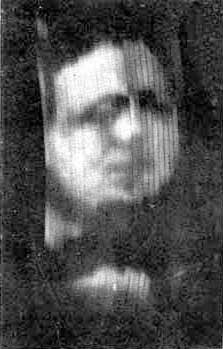
These mechanical TV's were largely impractical as they could not be scaled up to produce an acceptable resolution. The development of the electronic television was needed to allow the TV to advance to something that resembles the TV's that most of us grew up with.
The development of the cathode ray tube, or CRT, was key in bringing TV to the masses. This allowed for the actual television to work in a way that was acceptable to the masses, but there was still the problem of where the picture would come from. With film, the cinema needed a physical copy of what they were showing their audience, but TV would be different.
Taking a cue from radio broadcasts, the first TV stations used that same technology to transmit the TV signals to homes. The earliest stations were started by General Electric in New York, and the second station they created became what is now known today as WNBC. Maybe you've heard of it. Early broadcasts consisted of the news, live sporting events like boxing and baseball and early quiz shows.
The BBC also has a claim to fame in early broadcasting, as they were the first regular public broadcasting station, beginning in November of 1936. The BBC uses a different way of financing stations than we do in the US. In America, broadcasters must purchase a license from the FCC and are then granted permission to run commercials, which allows them to make money to keep the whole thing going. In England, the BBC instead imposes a license fee to individual television owners, which then goes to fund the BBC and their programming, which is delivered (mostly) commercial free to viewers.
TV Kills the Radio Star
Long before the Buggles 1979 song, the writing was on the wall for traditional radio. In the United States, by the 1960, radio networks had mostly stopped producing entertainment programs, instead relying on news, talk radio and music. This shift indicated that the general public was going to consume all of this via the TV instead.
The news became a nightly affair where you watched the anchor smoke the entire time and saw photos and video of the stories of the day. The Twilight Zone became a place where you were challenged to think of things in a different way. Doctor Who launched as an adventure in time and space that just may last throughout all of time and space. Sporting events became appointment television, though they were just a fraction of the spectacle they are today.
TV was a very common and shared experience throughout the 50's and 60's in America. It was a time that people were able to afford a set in every home and with only 3 networks, there weren't very many options. As a result, millions of people were watching the same thing at the same time, every night. You had to rush home to watch the show that started at 7, otherwise you were the one who was left out the next day.
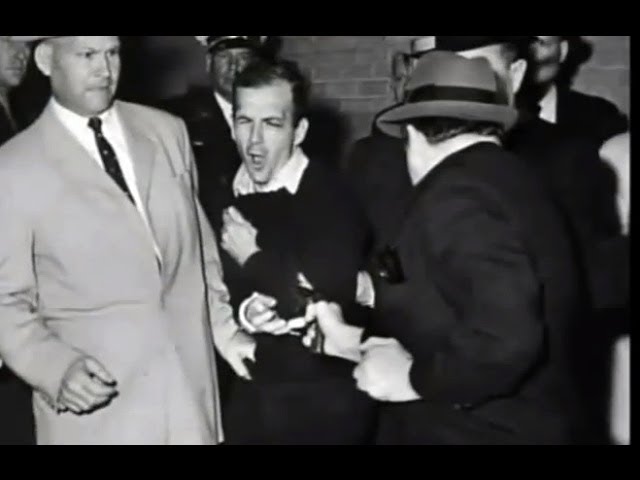
Radio was something that you could experience with a large group of people, if the volume was loud enough, but TV was an intimate experience. Only you and your family could fit around a set, so even though the shared experience of the content brought people together when they weren't watching TV, at the same time it became a device that could reach people on a very personal level.
By the mid-60's, TV became the medium that everything important happened through. Regular broadcasts were interrupted on November 22, 1963 to inform the world that the President of the United States had been shot in Dallas. This news spread like wildfire and to this day, those who were alive during that time will tell you exactly where they were when they learned the news.
TV is largely responsible for all of this, including getting Kennedy elected in the first place; he was the first candidate to debate on TV and looked a lot better than his counterpart, Richard Nixon. Two days after President Kennedy was shot, the world also saw Kennedy's assassin, Lee Harvey Oswald, get killed in front of our eyes while being transported from Dallas Police Headquarters to a nearby jail. It seems that once this happened, we were almost afraid to take our eyes off the tube.
TV's Adolescence
With the golden age of TV fading away, along with the illusion that everything on TV is wholesome and not at all terrifying (see the previous paragraph), it was time for TV to grow up. The late 60's showed Americans what war was really like, delivering the first full color broadcasts of war from Vietnam, an already unpopular war that was made even more unpopular with the images that were being broadcast into everyone's homes on a nightly basis. This could be looked at as the beginning of the media's power on TV, where previously their stronghold was radio and print media.
TV was also growing up on the technological front. The first satellite broadcasts took place in the early 60's, but did not become an industry until more than a decade later. Satellite TV in the late 70's and early 80's required a gigantic dish 10-16 feet in diameter to receive the signal. The end user cost of early satellite systems spurred the popularity of cable television systems and thus created the great battles we have today between cable and satellite providers.
This new technology became ubiquitous by the mid 80's and extremely popular by the 90's. A 2010 survey found that only 8% of TV households were still relying on OTA signals to receive TV, a result of the massive shift to cable and satellite TV providers. However, in 2012, a Nielsen survey showed that now 9% of households are relying on OTA, a sign that perhaps "cord cutting" is catching on.
Future of TV
After all this time, television continues to evolve. New TV’s in your house are bigger and thinner than ever. Some are curved, some bring you another dimension, and some take up an entire wall. People now have entire rooms devoted to their TV and TV networks are changing as well.
These days, there are many non-traditional options available. Netflix, Hulu and Amazon are all household names and starting to rival the size of TV networks. These new companies aren’t just streaming services either, they are becoming serious contenders in the overall market. Netflix and Amazon have both won awards for their shows (House of Cards, Orange is the New Black and Transparent, to name a few).
These companies can compete with the big boys, even though television networks still dominate the creative landscape. The old networks are trying to fill the online void on their own. Network exclusive streaming services like HBO Go, FX Now and CC.com are setting themselves up for what’s to come. As more and more people cut the cord, they are going to start signing up a la carte, much like people wished cable would be a long time ago.
Does this all really mean the traditional networks are going away? I doubt it - the 3 major networks have moved from radio into TV into 24 hour news and the era of media conglomerates. I suspect they’ll find a way, but just like Fox, Comedy Central and MTV, new networks will find their way into everyday life and stay there. Someday, Netflix will be the boring old coot and the next method, the next format, the next stars will be delivered into your home (maybe right into your brain?) in a whole new way. I’m sure we’ll all be there to marathon whatever show is out and complain that it’s not the same as in the books.

(WARNING – cliché late January WWE pun about to be made)
Well, it’s finally time take the on-ramp and start on the road to WrestleMania!!!!!
All joking aside, this is the start of the best part of the WWE year and my personal favorite event – the Royal Rumble!
Thinking of a way to take a look at one of WWE’s longest standing traditions, we have to do something more than just ranking the best matches or the most exciting moment, etc. So I give to you … (drum roll please – preferably from the drummer that HHH fired this past Monday which in turn made a kid cry in the front row…but much respect to HHH for his reaction to it!) … THE ULTIMATE RUMBLE!!!!
I went through and took a look at the order that everyone entered every Royal Rumble match and decided who was the best #1, the best #2, the best #3 etc. Only rule is that everyone could only be entered once (Stone Cold can’t be entered at #5 <1997> AND #24 <1998>).
So, channeling my inner-Howard Finkel, let’s all find out…who drew…number 1!
#1 – Two men have entered the Rumble at the number one spot and went on to win it. However, the first time it was done, it was in the shortest and possibly most unentertaining Rumble in history (plus the winner had a better performance that we’ll see later in the Rumble). AAAAAAAAAND the second decided that a strong legacy and great career were second to the thought of a double-murder/suicide decision…so…yeah he won’t be in this Rumble.
So with several other options to look at, the Ultimate Rumble will start with the swan song of CM Punk in 2014. Punk hung around for nearly 50 minutes before being eliminated by the already eliminated Kane. The elimination started a great storyline that took us to WrestleMania 30. That story involved Daniel Bryan since Punk didn’t come to work the next day, but a great story nonetheless.
#2 – Mr. McMahon won from this spot in ’99, but he did so by spending most of his time out of the ring. In contrast, Rey Mysterio set the record that still stands today by being in the Rumble for over 62 minutes en route to winning the 2006 match.
#3 – The 1992 Royal Rumble is arguably the most star-studded Rumble in history. With the impending induction of the Macho Man and the obvious eventual induction of The Undertaker, HALF of the participants in this match are in the Hall of Fame! It takes a big name to come out on top of this one. It doesn’t get much bigger than the Nature Boy Ric Flair. Flair was in the match for over an hour en route to winning the WWF Title the only time the title was up for grabs in the match.
#4 – In one of the first dominant performances in his career, The Rock entered the 1998 Rumble at the #4 spot and stayed until the end when he was the last one eliminated by Stone Cold Steve Austin. He didn’t win, but he definitely showed that he can hang in there for the long run. Rock would win his first WWF title less than a year later.
#5 – While I have just an unlimited amount of respect for Drew Carey and his performance in 2001, I’m going to have to go in a different direction. Just like The Rock started a strong 1998 with his Rumble performance, Stone Cold Steve Austin did the same the year before. Eliminating The Undertaker, Vader and Bret Hart to win in a controversial fashion, Austin would use 1997 to launch his career en route to becoming one of the biggest stars in history.
#6 – Rick “The Model” Martel set the record in 1991 by staying in the match for about 52 minutes (though the record would only last one year). While this was an impressive performance, Kane gets the nod here for his dominance in 2001. The Big Red Monster would be the last man eliminated after eliminating 11 superstars himself – a record that would stand for 13 years.
#7 – The 1994 Rumble was the first, and only, to give us two winners. Neither of the winners were nearly as dominating as Diesel was that year though. Big Daddy Cool, who was still sporting a fantastic mullet, eliminated seven men before he was eliminated by a joint effort of five men. This was the first of many impactful performances for Kevin Nash as the big man would start one of the longest title reigns of the modern era later in 1994.
#8 – Randy Orton punted the owner of the company in the head. Less than a week later, he won the 2009 Royal Rumble match. Something to think about, folks. (Legal disclaimer – I am not suggesting you punt your boss in the head)
#9 – This is not exactly the most exciting number in the Rumble’s history – some big names, but no real memorable performances. So we’ll put Hall of Famer Yokozuna's time in the 1996 match here. At least he had a confrontation with the debuting Vader which still makes me wonder why Vince didn’t have a massive monster vs monster match at WrestleMania that year!
#10 – The 1993 Rumble was the first to give the winner the championship match at WrestleMania. Though the match itself was a bit ho-hum, the crowd went crazy when Mr. Perfect came down. Perfect had a short stay in the match but did manage to eliminate the hated Ric Flair from the Rumble…and then from the WWF all together the next night in the memorable Career Ending match the next night on Raw.
#11 – While I would have loved to have put Mil Mascaras jumping from the top rope to the outside which eliminated himself from the match, we’ll put one of the most memorable eliminations (not on themselves) here instead. In 2002, The Undertaker had eliminated both Hardy Boyz who were still distracting the American Bad Ass outside of the ring. Jumping on the situation, Tough Enough champion Maven hit The Undertaker in the back with a dropkick knocking him out. Taker would head back into the ring, eliminate Maven, take him to the concourse area and throw him through the window of a popcorn machine…but that’s besides the point.
#12 – What’s a Royal Rumble without surprise entrants? In 2001, the Honky Tonk Man made a surprise appearance. It was good to see Honky and hear him sing again…and then pretty entertaining to see Kane grab the Honky Tonk Man’s guitar and smash it over his head before eliminating the legend. Thanks for coming!
#13 – Everything starts somewhere! It may not have been that exciting compared to what the Rumble is now, but Hacksaw Jim Duggan was the first Royal Rumble winner back in 1988. Can’t take that away from him!
#14 – Through my research I have come to the conclusion that #14 is the least exciting number there has been! So, because I want to, from 1993, I’m putting in The Berzerker! Give me one good reason not too!! HUSS!! HUSS!!
#15 – 11 eliminations was impressive for Kane – but as they say in the wrestling world…12 is a bigger number than 11. Roman Reigns set the new record in 2014 and laid the ground work for what could be an impressive career. An injury delayed what was set to be a smooth push at the end of last year. It just makes you think what is in store for Reigns this year.
#16 – So in 1996, Squat Team #2 was on his way down to the ring as the recently eliminated Squat Team #1 was walking to the back. The two identical twins decided that since no one could tell them apart they would both just go back in the ring! How smart was that?!?!? So what if their gear looked obviously different and the face paint was a little off on one, just look past that! Also look past that they were eliminated very shortly after coming back to the ring.
Yeah…#16 was a pretty boring number.
#17 – A year after making history as the first woman in the Rumble, Chyna entered the 2000 Rumble and became the first woman, and only since, to appear in the Rumble twice. I wonder what she’s been up to since … … …
#18 – Playing off of an injury return angle, Shawn Michaels went into the 1996 Rumble as the clear fan favorite. After single handedly eliminating 1,100 pounds of Vader and Yokozuna and a Superkick to knock his best friend, Diesel, out to win, ol' HBK went on to win one of the most memorable WrestleMania matches in history against Bret Hart and had a pretty good career thereafter.
#19 – In 2012, The Rock and John Cena had a match that was billed as “Once in a Lifetime” at WrestleMania 28. In 2013, Cena won the Rumble and started the story for the rematch against The Rock. You know – “Once Twice in a Lifetime.”
#20 – Kurt Angle snuck his way into the 2005 Rumble by stealing Nunzio’s number after losing the WWE Title match that night. Angle came in and made an big impact including eliminating Shawn Michaels – which began the program for their five-star WrestleMania match that year.
#21 – One of the earliest “big moments” in the Rumbles history came in 1990 when fans got the first face to face confrontation of Hulk Hogan and The Ultimate Warrior. The moment was quick, but laid the foundation for one of the biggest WrestleMania matches in history.
#22 – Sheamus won the 2012 Rumble after entering at #22…but that Rumble was horrible. A much better Rumble was the first after the WCW merger in 2002 in which Triple H came back from his first career threatening quad injury to win the match.
#23 – Lex Luger is the only person to win a Rumble (1994 co-winner with Bret Hart) entering at #23 so he gets to be here.
#24 – Stone Cold won from #24 in ’98…but he’s already in. Rock won from #24 in 2000…but he’s already in. Both were more impressive than Hulk Hogan was with his win in 1991. But, process of elimination, Hulk gets the spot here.
#25 – In another surprise entrant spot, Rob Van Dam made a surprise one night appearance in the 2009 Rumble and received a HUGE ovation. He didn’t really have that impressive of a showing – but neither did anyone else that came out at #25.
#26 – Please don’t be fooled by multiple people from the 2000 Rumble being on the list, it wasn’t that good. But Big Show had a dominant run and was the last one eliminated so he gets a spot here.
#27 – This has been regarded as the ‘magic number’ of the Rumble as a record four men have won from this spot – Big John Studd in ’89, Yokozuna in ’93, Stone Cold in ’01 and our #27 man Bret Hart in 1994. Hart had his leg taken out by his brother Owen in a match earlier in the night but managed to still make it to the Rumble and was the co-winner as he and Lex Luger both hit the floor at the same time.
#28 – It would be fun to have Dude Love in ’98 here (the third Face of Foley in the match that year) or even Santino Marella in ’09 (eliminated in a record :01). But it’s hard to pass up the fact the Batista won the Rumble match from the #28 spot TWICE – once in 2005 and again in 2014. Since Batista winning in 2014 really did not make too much sense creatively, we’re going to go with 2005 for The Ultimate Rumble.
#29 – Brock Lesnar won from this spot in 2003 but a surprise return from an ACL tear to win the 2010 match gives Edge the spot here. Plus, he eliminated John Cena last, so that gets him some extra points.
#30 – I consider 2007 to have the most exciting ending to a Rumble match when we were given several minutes and false finishes from two of the industries greats – Shawn Michaels and the winner and our #30 entrant, The Undertaker. Pretty hard to come up with anything wrestling related that doesn’t include The Dead Man.
#31 - #40 – In 2011, the Rumble expanded to 40 people. Instead of putting those last 10 entrants in by default, we’ll just put Alberto Del Rio in since he won that year after entering at #38.
So who wins the Ultimate Rumble you ask? Well…you tell me! Leave a comment here! Let me know on Twitter @Tadigity24 and tell me who you think wins the Rumble of all Rumbles!
Recent Articles
-
NFL Confidence Pool Picks & Strategy 2024 - Week 9
 Oh this is gonna be an interesting week for sure. Looking down the list of games and there aren’t too…in Fantasy Football / NFL
Oh this is gonna be an interesting week for sure. Looking down the list of games and there aren’t too…in Fantasy Football / NFL -
NFL Confidence Pool Picks & Strategy 2024 - Week 8
 Random observation here … We have a bit of an anomaly this week. Throughout most of the season we have…in Fantasy Football / NFL
Random observation here … We have a bit of an anomaly this week. Throughout most of the season we have…in Fantasy Football / NFL -
NFL Confidence Pool Picks & Strategy 2024 - Week 7
 This has been a dramatic season to say the least. While that is great while you’re watching the games on…in Fantasy Football / NFL
This has been a dramatic season to say the least. While that is great while you’re watching the games on…in Fantasy Football / NFL -
NFL Confidence Pool Picks & Strategy 2024 - Week 6
 If you haven’t noticed by now, we are in the thick of a time that plays a role in the…in Fantasy Football / NFL
If you haven’t noticed by now, we are in the thick of a time that plays a role in the…in Fantasy Football / NFL
Recent Podcasts
-
2023 Preseason Rankings & Name That Player
This week we're kicking off the 2023 season of fantasy football podcasts while on vacation - we'll chat about some players that we have ranked higher or lower than the expert consensus ranking at FantasyPros.com, and play a little game to see if folks can identify NFL players without their helmets on! Tune in and subscribe for more content from Jason & Dave throughout the season. -
Week 17, 'You're starting HIM?!'
We've taken our teams down the long road to victory, lined with those on injured reserve, guys who put up poor performances, and the blood, sweat, and tears of fantasy managers that were just unlucky. But let's not worry about that. The important thing is diving into some interesting starts and sits for the championship and discussing what's in the news that could affect your players or matchups over the next few days. Tune in live and ask your questions or leave your comments for us. Signing off until next preseason, your hosts Dave & Jason. This video/podcast will go live at 9pm CT on Wednesday, December 28, 2022 - it will also be available on all major podcast channels and remain available on YouTube for later review and comments. Join us live and add your comments/questions to the show! This video features the songs and artists listed below, available under a Creative Commons Attribution-Noncommercial license: - Various original music by David Biggs -
Week 16, Trending Topics
The fantasy football semifinals are upon us this week and your hosts Jason & Dave will be diving into some trending topics for week 16 including injuries, defensive matchups to exploit in the playoffs, weather reports for upcoming games, how to manage your roster for the last few weeks of the season, and more. Have a lineup question for your all-important matchup? Let us know! This video/podcast will go live at 9pm CT on Tuesday, December 20, 2022 - it will also be available on all major podcast channels and remain available on YouTube for later review and comments. Join us live and add your comments/questions to the show! This video features the songs and artists listed below, available under a Creative Commons Attribution-Noncommercial license: - Various original music by David Biggs -
Week 15, Playoff Q&A
Oh, so many questions. We take them via social channels, email, and website, and we watch network shows and listen to podcasts and radio broadcasts before, during, and after football games all to get a little bit of that tasty Q&A. Well, this week it's our turn and we've gathered some great questions from fellow fantasy football playoff bound folks that we intend to dig into this evening. Tune in live and add your comments and questions to the podcast. This video/podcast will go live at 9pm CT on Wednesday, December 14, 2022 - it will also be available on all major podcast channels and remain available on YouTube for later review and comments. Join us live and add your comments/questions to the show! This video features the songs and artists listed below, available under a Creative Commons Attribution-Noncommercial license: - Various original music by David Biggs
 Please wait...
Please wait...